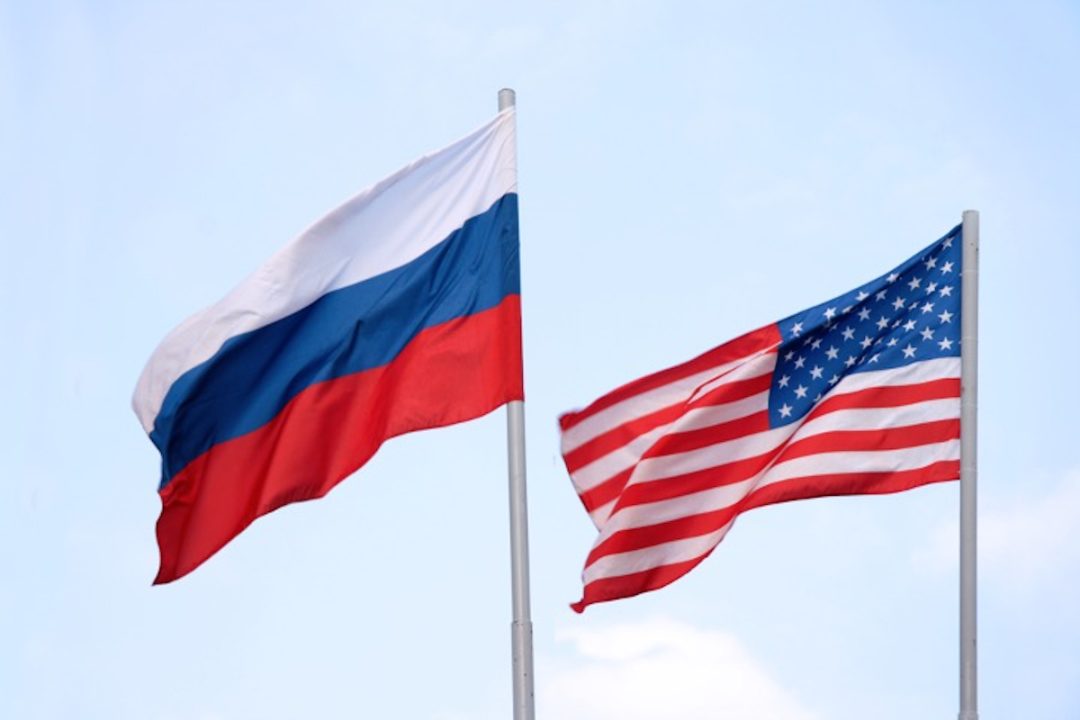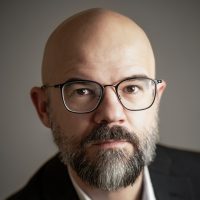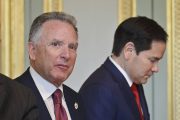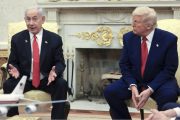
My, how things have changed. The president of the United States thinks Ukrainian leader Volodymyr Zelensky is a dictator, and Ukraine’s leader thinks the president lives in a “disinformation space.”
Ever since Russia invaded Ukraine in February 2022, White House messaging has consistently broadcast a binary narrative painting Ukraine as wholly good and Russia as very, very bad. But there’s a new sheriff in town, and as with so much else, President Donald Trump is turning America’s foreign policy on its head — or at least sideways.
Dictator Zelensky?
The reason Trump called Zelensky a dictator is because he refuses to hold elections. The president published a scathing social media post early Wednesday that read, in part:
Zelenskyy admits that half of the money we sent him is “MISSING.” He refuses to have Elections, is very low in Ukrainian Polls, and the only thing he was good at was playing Biden “like a fiddle.” A Dictator without Elections, Zelenskyy better move fast or he is not going to have a Country left.
Ukraine canceled its elections before they were scheduled to happen in spring of 2024, citing the war. Trump stressed during a press conference on Tuesday from Mar-a-Lago that if Ukraine wants a seat at the negotiating table with Russia, which it hasn’t had so far, it had better hold elections. Interestingly, as one of the reporters pointed out, Russia is not exactly a haven of “democracy” and free elections, either. But Russian President Vladimir Putin is not receiving billions in U.S. taxpayer money — not that being a dictator is an impediment to U.S. foreign aid.
Trump also explained why European leaders haven’t received invitations to the negotiating table. They’ve had a seat for three years and haven’t settled anything, he said, adding that “a half-baked negotiator could’ve settled this years ago.”
As far as the missing money Trump mentioned in his social media post, he is likely talking about a Feb. 2 interview during which Zelensky said that Ukraine only received around $75 million in weapons, training, transport, and humanitarian aid. Regarding those who say Ukraine received $200 billion, he said, “This is not true. I don’t know where all this money is.”
Trump’s special envoy for Ukraine and Russia, General Keith Kellogg, addressed this a few days after Zelensky’s comments. He said:
The United States of America, the American people, the citizens, have given Ukraine over $174 billion. And we have put inspector generals on the ground in Ukraine and here to track that money, so we have a pretty good accounting of where it’s going. … Some of that money that’s been authorized has actually been spent here in the United States to build up weapons systems that we’re sending over there. So if he thinks over $174 billion are sitting on the ground in a bank in Ukraine, well of course … we’re going to build up our stocks.
According to the U.S. government:
As of September 30, 2024, the U.S. Ukraine response funding totals nearly $183 billion, with $130.1 billion obligated and $86.7 billion disbursed.
NATO Expansion — Is Russia Telling the Truth? …
On Tuesday, U.S. and Russian officials met in Riyadh, Saudi Arabia, and agreed to appoint teams to negotiate a peace deal and end the war. The meeting ended a three-year U.S. policy that focused on isolating Moscow. Relations between the nations’ leaders have warmed since. Secretary of State Marco Rubio said both sides have agreed not only to work on a peace settlement, but to explore “the incredible opportunities that exist to partner with the Russians.” Putin, for his part, said talks had been “friendly.” And perhaps most significantly, Russian Foreign Minister Sergei Lavrov said Trump “is the first, and so far, in my opinion, the only Western leader who has publicly and loudly said that one of the root causes of the Ukraine situation was the impudent line of the previous administration to draw Ukraine into NATO.” He added, “It’s a signal that he understands our position.”
Russia’s point that Ukraine’s invitation into NATO served as a legitimate provocation for the invasion lies at the heart of the blame game. Former acting president Joe Biden repeatedly called Russia’s invasion “unprovoked.” This also has been the prevailing talking point parroted throughout Western mainstream media since the war begin. The Russians say Ukraine’s invite to NATO threatens their national security and breaks a promise Russian leaders received from Western leaders decades ago, right after the official fall of the Soviet Union. Putin said Western powers agreed in the early 1990s that NATO would not expand “one inch to the East” if Germany was allowed to reunify within NATO. And now, the president of the United States sympathizes with this point. Trump said during a Jan. 7 press conference:
A big part of the problem is, Russia — for many, many years, long before Putin — said, “You could never have NATO involved with Ukraine.” Now, they’ve said that. That’s been, like, written in stone. And somewhere along the line, Biden said, “No. They should be able to join NATO.” Well, then Russia has somebody right on their doorstep, and I could understand their feelings about that.
… Yes, They Likely Are
Declassified documents stored at the National Security Archive at George Washington University indicate Russian officials are likely telling the truth. According to a summary:
U.S. Secretary of State James Baker’s famous “not one inch eastward” assurance about NATO expansion in his meeting with Soviet leader Mikhail Gorbachev on February 9, 1990, was part of a cascade of assurances about Soviet security given by Western leaders to Gorbachev and other Soviet officials throughout the process of German unification in 1990 and on into 1991, according to declassified U.S., Soviet, German, British and French documents.
U.S. officials also told Gorbachev that the future European security alliance would include Russia, not exclude it, according to declassified docs. This corroborates what Putin told Tucker Carlson when the latter conducted his controversial interview in Moscow a year ago.
Declassified documents also show British officials agreeing the Russians should have assurances that Poland wouldn’t join NATO, either. Poland joined in 1999, as did several Central and Eastern European nations later. Thirty-two nations are now part of the alliance, sixteen of them having joined after the end of the Cold War, with several of them far past the center point of Germany.
This doesn’t wholly absolve the Russians of blame. From a just and isolated perspective, a sovereign nation should be free to make alliances with whomever it chooses without being invaded. But that’s a theoretical perspective in a practical world comprising very different dynamics.
Goal of Negotiating
Unlike Biden and Europe’s warmongering leaders, Trump desires to end the human carnage and prevent a nuclear world war. “People are dying,” he has said repeatedly. The Biden administration response to Putin’s repeated threats of nuclear escalation had been to dismiss them as nothing more than empty bluff.
Secretary of Defense Pete Hegseth told NATO officials on Feb. 13 that the goal of negotiating is “a diplomatic peaceful end to this war as quickly as possible in a manner that creates enduring and durable peace.”
The globalists at the Council on Foreign Relations are now admitting what we all have known but was never said in mainstream media: Russia is winning the war. Nevertheless, representing the posture of globalists, the CFR advocates not peace, but a strategy that includes NATO nations increasing military cooperation and continuing the war until “Russia will see ever fewer benefits to continuing the fight.”
Is the U.S. Leaving Europe, NATO?
During his Mar-a-Lago press conference, Trump fielded questions pertaining to the future of European security and America’s role in it.
He told reporters he had no problem with Europeans putting “peacekeeping troops” in Ukraine. “It means we won’t have to,” he said. European leaders have already signaled they plan to do just that. Earlier this month, British Prime Minister Keir Starmer “said he is prepared to put British troops on the ground in Ukraine if there is a deal to end the war with Russia — acknowledging it could put UK forces ‘in harm’s way’ if Vladimir Putin launches another attack,” The Guardian reported Feb. 16.
Mainstream media speculation has included the narrative that Trump’s foreign policy will end NATO. But Trump and those in his administration have indicated nothing of the sort. When asked if he’s considering removing all U.S. troops from Europe, Trump said no. Hegseth told those same NATO officials that America is committed to building a stronger, “more lethal NATO.” He called NATO “the most successful defense alliance in history,” and said it was time to “make NATO great again.” But he did signal that the United States will not be present in the region as much as it has been, and that it’s time for Europe to pitch in more money:
Leaders of our European allies should take primary responsibility for defense of the continent, which means security ownership by all allies guided by a clear understanding of strategic realities and it’s an imperative given the strategic realities that we face. And that begins with increasing defense spending. 2 percent is a start, as President … Trump has said, but it’s not enough, nor is 3 percent, nor is 4 percent. More like 5 percent. Real investment. Real urgency.
The Folly of NATO Membership
It is unfortunate that the Trump administration doesn’t see the folly of NATO membership. The parent company of this magazine, The John Birch Society, has always advocated the U.S. abandoning the globalist entity. They continue to do so. NATO membership increases the likelihood for America to be pulled into war. If a NATO member nation goes to war, all member countries must join in. But without NATO, a war may be contained within that region and among the involved nations and the allies they’ve entered into individual alliances with.
Moreover, the NATO alliance serves as an excuse to submerge every nation into a one world global order. In a recent interview with Tucker Carlson, policy expert and Columbia Professor Jeffrey Sachs, who has been involved in numerous “stabilization” plans in Europe, admits the Western goal with NATO was to take over the entire world, just like in the game of “Risk”:
It was a game. They thought they’d win the game. … The game of “Risk” was a big game for me. You wanted your piece on every part of the world map. That was the game. When you took over the whole world, world hegemony we now call it, you won. They’re playing that game.





